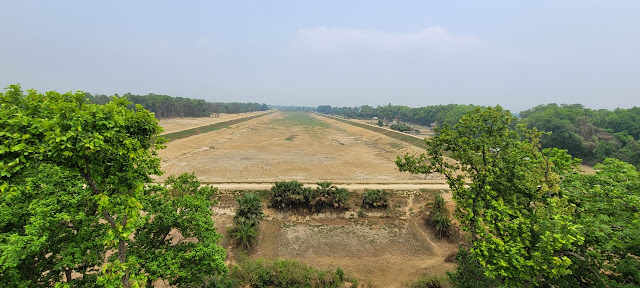Farming in Barind: Govt, NGO officials at odds
An altercation between NGO officials and government agricultural scientists broke out at a workshop in Rajshahi Circuit House yesterday, which was attended by Agriculture Minister Md Abdus Shahid.
The workshop was jointly organised by DASCOH, World Bank's 2030 Water Resources Group (2030 WRG), and Coca-Cola Bangladesh Limited.
During the workshop, the minister asked the government agriculturists what they have been doing, when NGOs are pointing out and solving different issues, which resulted in the altercation.
Syeda Sitwat Shahed, consultant of Agricultural Water of 2030 WRG, presented a multimedia presentation at the beginning of the programme, where she described the necessity for adopting climate-smart technologies in Barind region and shared their experiences from the project titled "Introducing Water Efficient Technologies".
She also called for reducing the water-requiring rice cultivation in the region, saying rice fields are emitting methane, accelerating global warming.
Following her presentation, the minister asked agricultural officials what they have been doing regarding the rice cultivation issue.
The workshop was jointly organised by DASCOH, World Bank's 2030 Water Resources Group (2030 WRG), and Coca-Cola Bangladesh Limited.
During the workshop, the minister asked the government agriculturists what they have been doing, when NGOs are pointing out and solving different issues, which resulted in the altercation.
Syeda Sitwat Shahed, consultant of Agricultural Water of 2030 WRG, presented a multimedia presentation at the beginning of the programme, where she described the necessity for adopting climate-smart technologies in Barind region and shared their experiences from the project titled "Introducing Water Efficient Technologies".
She also called for reducing the water-requiring rice cultivation in the region, saying rice fields are emitting methane, accelerating global warming.
Following her presentation, the minister asked agricultural officials what they have been doing regarding the rice cultivation issue.
He also asked why they cannot perform like NGOs.
In response, Dr Fazlul Haque, head of Rajshahi regional office of Bangladesh Rice Research Institute (BRRI), said the idea of reducing rice production in Barind would be fatal for the country.
Moreover, a BRRI research disagreed with the concept of rice fields harming the environment by generating methane, he added.
Barind region has contributed to the country's food safety by producing 6 crore tonnes of rice annually, Haque said, adding, "Research proved the rice fields in the country absorb 38 million tonnes of carbon dioxide."
Md Abdur Rouf, programme development lead of Syngenta Foundation, said BRRI's calculation might be wrong as methane emissions are globally acknowledged.
Meanwhile, Abdur Rashid, executive director of Barind Multipurpose Development Authority, said they reduced 2 percent of water use by introducing pre-paid meters and Alternate Wetting and Drying (AWD) projects.
On the other hand, Dr Md Shakhawat Hossain, senior scientific officer of On-Farm Research Division of BARI, said they identified that AWD projects will not be successful without precision land levelling.
Then the minister asked the officials not to argue with each other and to work together instead.
He also directed agricultural officials to ensure proper extension of agriculture in the country.
In response, Dr Fazlul Haque, head of Rajshahi regional office of Bangladesh Rice Research Institute (BRRI), said the idea of reducing rice production in Barind would be fatal for the country.
Moreover, a BRRI research disagreed with the concept of rice fields harming the environment by generating methane, he added.
Barind region has contributed to the country's food safety by producing 6 crore tonnes of rice annually, Haque said, adding, "Research proved the rice fields in the country absorb 38 million tonnes of carbon dioxide."
Md Abdur Rouf, programme development lead of Syngenta Foundation, said BRRI's calculation might be wrong as methane emissions are globally acknowledged.
Meanwhile, Abdur Rashid, executive director of Barind Multipurpose Development Authority, said they reduced 2 percent of water use by introducing pre-paid meters and Alternate Wetting and Drying (AWD) projects.
On the other hand, Dr Md Shakhawat Hossain, senior scientific officer of On-Farm Research Division of BARI, said they identified that AWD projects will not be successful without precision land levelling.
Then the minister asked the officials not to argue with each other and to work together instead.
He also directed agricultural officials to ensure proper extension of agriculture in the country.


Comments
Post a Comment